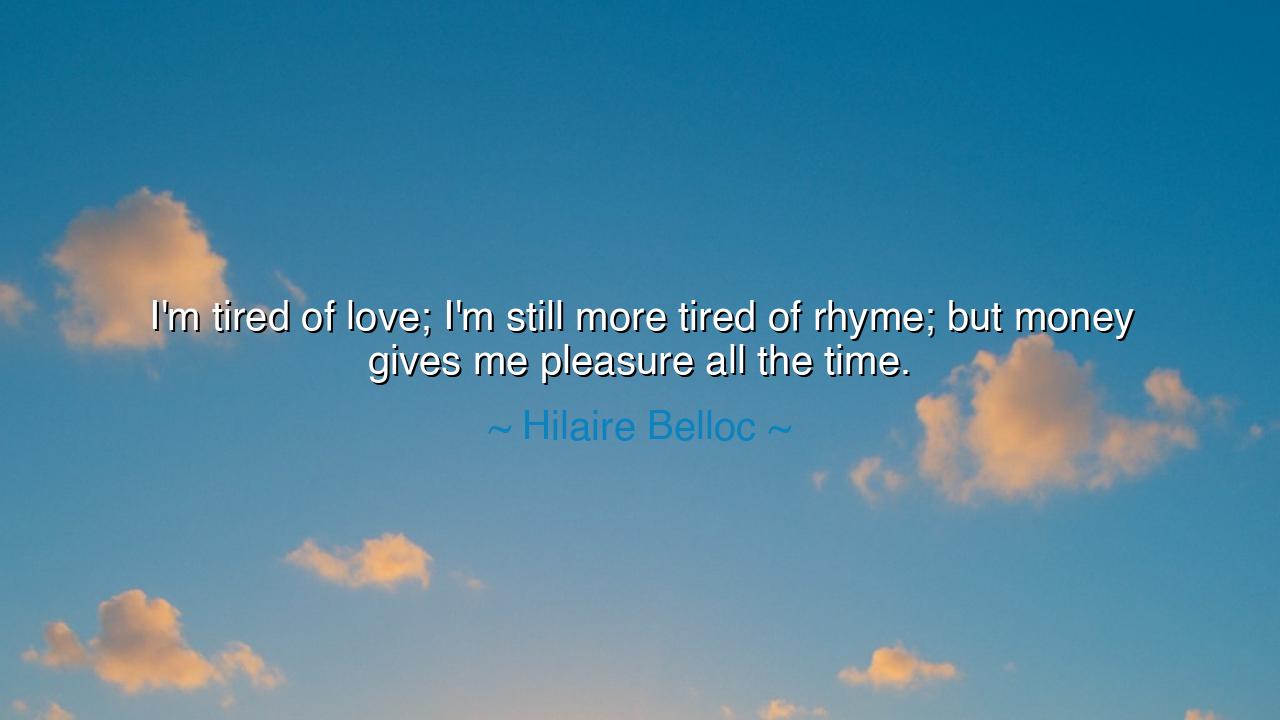
I'm tired of love; I'm still more tired of rhyme; but money
I'm tired of love; I'm still more tired of rhyme; but money gives me pleasure all the time.






Hear the voice of Hilaire Belloc, poet, satirist, and sharp critic of human folly, who once declared with biting wit: “I’m tired of love; I’m still more tired of rhyme; but money gives me pleasure all the time.” At first, these words sound as cynicism, even jest, but beneath them lies a mirror reflecting the weariness of the human heart and the dangerous allure of wealth. For Belloc, master of irony, was not praising greed but revealing the stark temptation that ensnares so many: the fleeting, unstable passions of art and affection often pale before the steady comfort of coin.
The ancients too spoke of this tension. The philosophers of Greece exalted love as the highest virtue, the bond of harmony between mortals and gods. The poets built their lives on rhyme, weaving beauty into verse. Yet still, kings and common men alike bent the knee before money, for with it came power, security, and influence. Belloc’s words echo across time as both confession and provocation: the spirit may strive for lofty things, but the flesh too often clings to gold.
Consider the life of Diogenes the Cynic. He mocked wealth, lived in poverty, and declared that money corrupted the soul. Yet even he, when wandering through Athens, saw how people flocked not to the wisest, nor the most loving, nor the most poetic, but to the richest. The lesson was bitter but undeniable: in the affairs of men, money often triumphs over love and over art. Belloc, with his ironic tone, reminds us of this uncomfortable truth, though he himself was no worshiper of coin.
Belloc lived in a world that knew both the beauty of literature and the cruelties of modern industry. As a writer, he tasted the exhaustion of crafting endless rhyme, the strain of pouring soul into art. As a man, he knew the fickleness of love, its power to uplift but also to wound. Yet money, though base and common, provided immediate and undeniable pleasure: food, comfort, travel, the freedom to live as one wished. His verse, laced with irony, forces us to confront the paradox—how something so soulless can seem to offer more constancy than the highest passions of the heart.
But hear this warning, O seekers of wisdom: the pleasure of money is real, but it is shallow. It soothes, but it cannot heal. It comforts, but it cannot fulfill. Love may wound, art may exhaust, yet these are the wells from which the soul drinks meaning. To rest only in money is to build a house on sand—stable in appearance, yet hollow at its core. Belloc’s quip, though humorous, is a cautionary spark: beware of choosing the easy comfort of coin over the deeper, though harder, gifts of love and creativity.
The lesson is plain: do not despise love, even if it tires you. Do not forsake art, even if it wearies you. For these are the treasures that endure in memory and spirit. Money may purchase delights, but it cannot weave the bonds of friendship, nor kindle the fire of beauty, nor lift the soul to noble heights. Let Belloc’s irony serve as your reminder: pleasure lies in coin, but meaning lies in the higher callings of life.
Practical wisdom lies before you: use money as servant, not master. Pursue it, yes, for it is needed, but do not worship it. When weary of love, remember that its power lies not in perfection but in persistence. When tired of art, remember that its toil bears fruit beyond the moment. Balance the fleeting comfort of money with the eternal worth of the heart and the spirit, and you will live a life both grounded and exalted.
Therefore, let Belloc’s words remain in your heart: “I’m tired of love, I’m still more tired of rhyme, but money gives me pleasure all the time.” Hear the jest, but do not miss the warning. The pleasures of wealth may be constant, but the treasures of the soul are greater. Seek them, cherish them, endure their trials, and in the end, you will find not only pleasure, but the deeper joy of a life lived truly and well.






AAdministratorAdministrator
Welcome, honored guests. Please leave a comment, we will respond soon